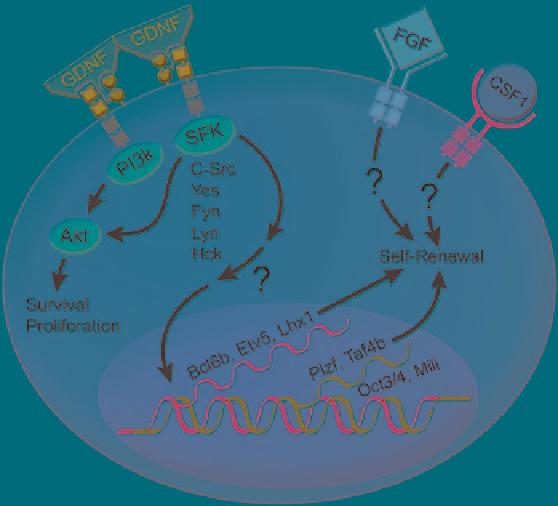Biomedical Engineering Reference
In-Depth Information
Fig. 7.3
Current understanding of molecular mechanisms regulating mouse SSC self-renewal and
survival. Extrinsic stimulation by GDNF is essential for SSC self-renewal and this fate decision is
enhanced by further stimulation from FGF2 and CSF1. GDNF binding to the receptor complex of
c-Ret tyrosine kinase and GFRa1 activates PI3K and SFK intercellular signaling pathways causing
down-stream activation of AKT signaling, which influences SSC survival. SFK signaling also
activates a second pathway, yet to be defined, that regulates expression of specific genes important
for SSC self-renewal. The transcription factor encoding genes
Bcl6b
,
Etv5
, and
Lhx1
are regulated
through this pathway and are important for maintenance of SSCs
in vitro
. Additionally, the tran-
scription/translation factors MILI, NANOS2, OCT3/4, PLZF, and TAF4B have been implicated as
regulators of SSC self-renewal in mice. The expression of these molecules is not influenced by
GDNF stimulation in cultured SSCs, and their importance in SSC self-renewal
in vitro
has not
been determined. SFK stimulation by either GDNF or FGF2 also leads to down-stream activation
of RAS proto-oncogene, which up-regulates cyclin D2 expression to influence SSC entry into G1
phase of the cell cycle. Intermediaries of RAS activation of cyclin D2 expression have not been
elucidated. To date, mechanisms by which CSF1 influence self-renewal and survival of SSCs have
not been reported. Image is modified and reprinted, with permission, from the Annual Review of
Cell and Developmental Biology, Volume 24 © 2008 by Annual Reviews,
http//:www.
annualreviews.org
(Oatley and Brinster
2008
)
and survival is summarized in Fig.
7.3
. GDNF stimulation activates SFK and PI3K/
AKT signaling pathways followed by down-stream regulation of
Bcl6b
,
Etv5
, and
Lhx1
gene expression to control SSC self-renewal and survival. Additionally,
downstream of SFK signaling is activation of the proto-oncogene RAS, which
influences cyclin D2 expression to regulate cell cycle progression of cultured SSCs.
Furthermore, the non-GDNF-regulated genes
Mili
,
Ngn3
,
Oct3/4
,
Plzf
, and
Taf4b
have also been implicated as regulators of SSC function through currently unde-
fined mechanisms.

Search WWH ::

Custom Search